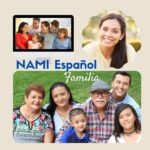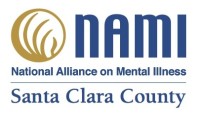 NAMI Español extends a mental health lifeline to Latino families, especially in Santa Clara County where 25 percent of the population, or 500,000 people, make up the Latino community.
NAMI Español extends a mental health lifeline to Latino families, especially in Santa Clara County where 25 percent of the population, or 500,000 people, make up the Latino community.
Having a Spanish option within the NAMI Santa Clara County affiliate provides a comforting voice to those in need of mental health assistance. Lourdes Robles-Velazquez, who serves as the Community Peer Program Director, has been at the forefront of broadening Spanish-speaking services to the NAMI Latino community since 2015.
Like so many who found their way to NAMI, Lourdes needed help for herself and her daughter. She took the Family-to-Family class which at the time was only offered in English. The Spanish coordinator asked Lourdes to assist with the translation; from there her role with the organization grew. She described it as a perfect match with her Bachelor’s degree in psychology.
Today, working with Juan Perez, a NAMI-SCC board member and Vice President of Latino Outreach, Lourdes wants to reach as many Spanish-speaking individuals as possible.
When Juan, also a member of the Office of Family Affairs for the SCC Behavioral Health Services Department, wanted to use WhatsApp as a communication tool for the Wellness Recovery and Action Plan Program (WRAP), Lourdes saw immediate crossover value. Many families lived in cities like Gilroy, making it difficult to come to the NAMI-SCC office.
“I thought this was a great idea since so many of our Latino families already used the app to speak with families in Mexico and Central America,” she said.
The idea caught on quickly, especially as isolation and mental health issues exploded during the pandemic. “When someone texted about having a hard time, someone else would text asking how they can help,” Lourdes said. “People cared.”
Today, close to 30 people work in various capacities with NAMI Latino. Erika Alvarez Hernandez is the affiliate’s Spanish Coordinator. Erika converses in Spanish, connecting those in need with mental health assistance. She also teaches a Spanish Peer-to-Peer class. Erika credits the NAMI-SCC with putting her life back together. “The job gives my life meaning and a reason for being,” she said. “I bless the hour when life put me on the road to NAMI.”
After California Governor Newsom put COVID stay-at-home orders into place last March, being able to connect with a Spanish-speaking NAMI employee became even more critical. Before COVID, NAMI Latino actively participated in various county healthcare fairs. “When we were out there, we noticed people were hesitant and nervous,” Lourdes said. “They asked for information to give a “family” member or “friend.” I worried these people would drop off. But just the opposite happened.”
Within two weeks of the quarantine, NAMI-SCC had its Latino support groups online, and demand became so strong that groups went from monthly to weekly meetings. NAMI National also changed the participation requirements for the Latino community because there weren’t enough Spanish-speaking facilitators. With the elimination of location-based participation, NAMI-SCC had individuals join from Santa Rosa, Southern California, Kentucky, Connecticut, and South America.
As the pandemic forced changes, Lourdes and others at many California affiliates expressed an urgent need to NAMI National for the new Family-to-Family manual to be translated into Spanish. The growing Latino population needed their own version of the program. As Lourdes and NAMI Monterey facilitator Rosa Rivas pushed for action, NAMI National’s Spanish Program Manager Anais Nin, listened and prioritized the project.
Lourdes in San Jose, Rosa in Monterey, and other Spanish-speaking facilitators across the country teamed up with National to complete the Family-to-Family translation. The Spanish version should be available in April or May, 2021.
NAMI-SCC also launched a NAMI Español webpage where the Latino community can locate pertinent information on mental health conditions. Since going live, the website continues to draw significant visitor traffic including Spanish speakers being redirected from other affiliates.
The demand for NAMI Latino facilitators continues to grow locally and throughout the country, Lourdes said. Currently NAMI-SCC has four facilitators waiting to be trained. But it’s not as simple as studying a manual or speaking Spanish. The process is more nuanced. Lourdes explains that these individuals need to be part of a specific community because differences exist among countries. Mexico, Cuba, Puerto Rico, and Central America have distinct cultures and the facilitator needs to be tuned into those subtleties. For example, strong religious beliefs may bump up against Family-to-Family teachings. Or parents may be skeptical about medications and potential addiction as part of mental health treatment. The facilitator must gently educate and bridge the divide between culture, religion, science, and medicine.
As nonprofits like NAMI deal with pandemic challenges, Lourdes points out several revelations. The unexpected online success of the NAMI Latino programs, which will probably evolve into hybrid versions that blend online and in-person support simultaneously. “We do miss getting together in person,” Lourdes said, but this will enable individuals and families to participate remotely when they can’t come in person. The other positive has been greater transparency and awareness about mental illness.
Lourdes’ commitment to the Latino community can be heard in her voice and her actions. Her vision remains unwavering when she says, “I hope to build a stronger nationwide network of facilitators to support each other so our Latino population can have the same support and help as every other community has.”










































